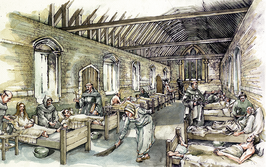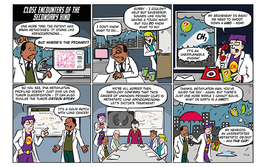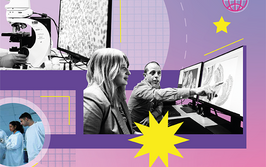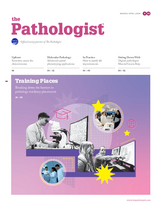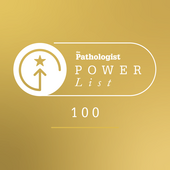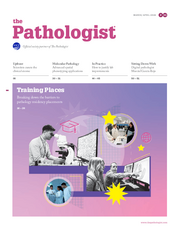Yes, You Can Be a Pathologist!
For students to see pathology as a viable career choice, we must make the discipline visible in undergraduate medical education
Rick Mitchell | | Opinion

Throughout my career, I’ve been very involved in pathology education. Serendipity played a major role in that involvement. Throughout graduate school and in the first couple of years of medical school, I dabbled here and there – from teaching Mendelian genetics to fourth-graders in Manhattan to TAing microbiology for first-year med students. It was fun, but not something I saw as a major path forward.
However, as I entered my pathology residency, my mentors, Ramzi Cotran and Fred Schoen, were ardent believers in the role of pathology (and pathologists) in medical education. Both were heavily involved in the writing and editing of the Pathologic Basis of Disease and Basic Pathology textbooks, and I was invited to contribute to a couple of chapters, eventually serving as editor on one edition of Basic Pathology and shepherding the Pocket Companion through several iterations.
At that time, Fred Schoen was also directing the combined Harvard–MIT Health Sciences and Technology (HST) pathology course at Harvard Medical School. He encouraged me to run laboratory sessions, and then to give a couple of lectures – and I was hooked. Teaching at that level, to such outstanding students, was both exciting and terrifying, combining a sort of performance art with the satisfaction of providing the foundations for the next generation of physician-scientists.
When Fred stepped down, I took on the course and, through my connections to the HST program, became increasingly involved in overall curriculum design at Harvard Medical School. I have also been very active in the American Society for Investigative Pathology, chairing the education and programming committees for an international organization. Through all of this, I’ve been incredibly fortunate to have supportive chairs (Cotran, Michael Gimbrone, and Jeff Golden) who share the view that education is as important to the practice of pathology as the diagnostic and research components. I think I’d gladly give up a lot of things I juggle now (especially administrative responsibilities!), before I give up teaching; it’s that satisfying.
Unfortunately, the current trend toward truncating preclinical basic science exposure means that students see pathology and pathophysiology mainly through the lens of a longitudinal and integrated curriculum where the word “pathology” might not even appear in a course description. In that environment, students do not get to clearly appreciate the role a pathologist can play in education and research. And, on the wards, most schools do not draw any attention to the function of the pathologist in diagnosis and driving patient care decisions; it is the exception, rather than the rule, for students to attend tumor boards and other conferences that highlight the critical responsibility of the pathologist.
Most students have never seen an autopsy, a surgical pathology cutting room, the transfusion medicine suite, the frozen section room, or the clinical labs. As a result of this lack of exposure, the overwhelming majority of students never get a chance to understand that “pathology” is a career they can pursue. In the 2019 residency match for example, only about 200 US medical school graduates applied for over 600 pathology residency slots!
To stay visible and relevant, we need to push back on the preclinical education process; pathologists need to be represented on curriculum committees and be vocal about having a more obvious role. At a bare minimum, we should take five minutes out of our lectures and describe for the enthralled masses what a career in pathology can entail. We can also help the cause by encouraging greater foundational pathology content on the USMLE exams; there’s no incentive for medical schools to teach pathobiology if their students are not going to be tested on it.
In hospitals, pathologists should encourage their clinical associates to carve out time for “road trips” to the pathology labs, or even week-long experiences in pathology. For students on surgery rotations, this could take the form of following specimens to the frozen section room, to the cutting room (helping to find lymph nodes?), and to the final sign-out. For students on medicine rotations, this could involve going to tumor boards, working up patients for plasmapheresis, going to microbiology plate rounds, or learning some of the nuances of flow cytometry or molecular diagnostics. It’s doubtful that pathology will ever become a mandatory rotation, but requiring it to be integrated into the experiences on other clerkships (beyond just another PowerPoint) will go a long way toward getting pathology on students’ radars – and that’s something we should prioritize at all costs.
Lawrence J. Henderson Professor of Pathology, Brigham and Women’s Hospital and Harvard Medical School, Boston, USA.

